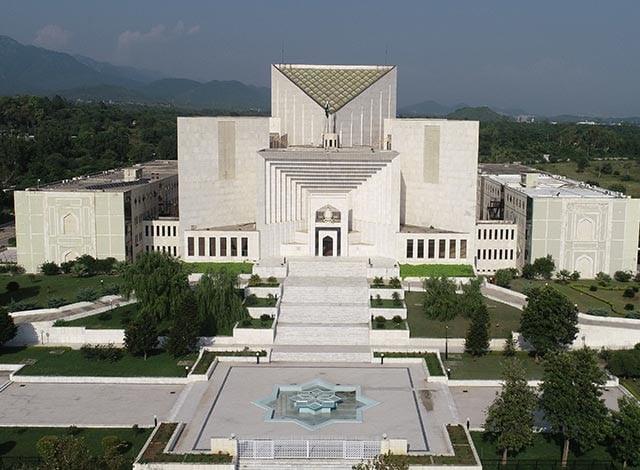ISLAMABAD:
As the constitutional judiciary delays hearing petitions challenging the 26th Constitutional Amendment, the Supreme Court has questioned the validity of the amendment, which prevents ordinary judiciary from exercising jurisdiction in matters involving interpretation of law and the constitution.
A three-judge bench, headed by Justice Syed Mansoor Ali Shah, issued a two-page written order, stating that the petitioners claimed that the present bench could not hear cases related to subsection (2) of Article 221 -A of the Customs Act of 1969., because these call into question the constitutionality of a law.
Legal experts believe that the ordinary judiciary has effectively taken up the task of examining the validity of the 26th constitutional amendment. “The basis of judicial review rests precisely on this premise,” one expert noted, referring to Marbury v. Madison in the United States and Pir Sabir Shah in Pakistan.
Experts suggested that the judiciary could suspend the amendment’s provision preventing regular judges from hearing certain cases.
Mirza Moiz Baig, a lawyer, pointed out that although Article 191-A of the Constitution, introduced by the 26th Amendment, limits the jurisdiction of regular benches, these “exclusion clauses” are generally interpreted restrictively.
He explained that as such, since Article 191-A takes away the jurisdiction of the Supreme Court to hear certain cases and confers such jurisdiction on special “constitutional” chambers, the ordinary chambers of the Supreme Court could well delimit the contours of article 191-A. A.
Along the same lines, even though Article 191-A suggests that questions relating to the validity of the 26th Amendment can only be decided by the “constitutional bench” of the Supreme Court, we must not lose sight that these rooms must also exist. to the 26th Amendment.
Any decision on the validity of the amendment by the judges of the “Constitutional Chamber” may therefore raise concerns about judicial expediency.
“A regular bench of the court determining the contours of Section 191-A may therefore propose that the Chief Justice constitute a full bench to determine the vires of Section 191-A and examine whether the provision infringes upon the salient features of the Constitution.”
“This position is also crystallized given that the Supreme Court has always held that a court hearing a matter can decide matters relating to its own jurisdiction,” Baig noted.
Earlier, Justice Mansoor Ali Shah had consistently urged Chief Justice of Pakistan Yahya Afridi to give priority to petitions challenging the 26th Amendment.
Despite this, the petitions were not listed, with the chief justice believing that the constitutional bench should determine the fate of the amendment. However, Justice Shah disagreed, stating that the Constitution does not prohibit the full court from considering the 26th Amendment.
The constitutional formation, however, continues to delay the examination of the requests. Its composition has also come under scrutiny, as judges of the constitutional judiciary are appointed by the executive. So far, the constitutional bench has struggled to make an impact, even though Justice Ayesha Malik, who is appointed to the constitutional bench, is also part of the current regular bench which issues the order.
Some lawyers believe that Judge Shah should refrain from making any decision that could lead to his disqualification from the full hearing on the 26th Amendment. The majority of constitutional justices are expected to agree that all justices should hear the case.
Meanwhile, a meeting of the All Pakistan Lawyers Action Committee is scheduled today (Wednesday) to discuss an action plan to roll back the 26th constitutional amendment.
Responding to the decision of the three-member regular bench, legal expert Hafiz Ahsaan Ahmad argued that as per clause 5 of Article 191-A of the Constitution, all petitions, appeals or requests for review against judgments or orders covered by clause 2, whether pending or filed before the commencement of the 26th Amendment, should be transferred to the constitutional judiciary.
These cases are heard exclusively by the benches constituted under Article 175-A of the Constitution. Therefore, he argued that the customs case in question should have been transferred to the constitutional jurisdiction.
Hafiz Ahsaan said the 26th amendment had redefined the jurisdiction of the SC by introducing changes in certain articles of the constitution. He emphasized that in light of this reinterpretation, no other court, in the presence of a constitutional court, can issue an order clarifying the jurisdiction of such matters.
This includes matters falling under clauses (a), (b) and (c) of Article 191-A of the Constitution. Therefore, he argued, the order passed by the three-member bench on January 13, 2025 in the Customs case – which requires judicial interpretation – should not have been passed by a regular bench.
Since this case involves the interpretation of Section 221-A of the Customs Act, 1969, it falls squarely within the jurisdiction clearly defined by the 26th Amendment and therefore should have been referred to the Constitutional Court.
Hafiz Ahsaan pointed out that this order is inconsistent with the provisions of Article 191-A, especially since several petitions challenging the validity of the 26th Amendment are already expected to be heard by the constitutional bench.
The presiding judge had previously referred numerous cases to the clerk’s office due to similar jurisdictional issues. He described this particular order as a potential rewriting of the Constitution, which he believes lacks legal viability.
Finally, Hafiz Ahsaan concluded that since clause 5 of Article 191-A only designates the Constitutional Bench as the appropriate body to hear and decide such cases, the regular three-member Bench should have acceded to the request made by the council of the federation to transfer the case to the constitutional court to obtain the required legal interpretation.




